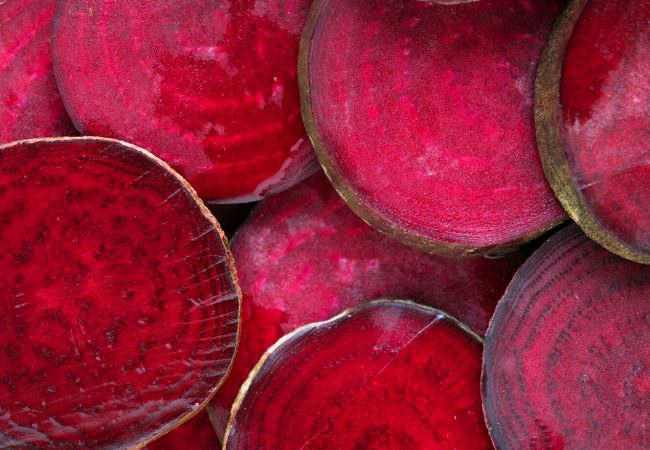
The Nutritional Powerhouse: Beetroot Health Benefits
Beetroot, commonly known as beet, is a vibrant and versatile root vegetable that has gained immense popularity due to its impressive nutritional profile and numerous health benefits. Whether consumed raw, cooked, juiced, or pickled, beetroot offers a delightful combination of earthy flavors and essential nutrients that contribute to overall well-being. In this article, we will explore the nutritional value of beetroot and the ways it supports a healthy lifestyle.
Beetroot is a low-calorie vegetable packed with essential vitamins, minerals, and bioactive compounds. Here is a breakdown of its nutritional composition per 100 grams:
Calories: 43
Protein: 1.6 grams
Carbohydrates: 9.6 grams
Sugars: 6.8 grams
Fiber: 2.8 grams
Fat: 0.2 grams
Beetroot is rich in:
Folate (Vitamin B9): Supports cell growth, DNA synthesis, and proper brain function.
Vitamin C: An antioxidant that boosts immunity and promotes healthy skin.
Potassium: Helps maintain healthy blood pressure and nerve function.
Manganese: Supports bone health and metabolism.
Iron: Essential for oxygen transport and energy production.
Beetroot contains several bioactive compounds that contribute to its health benefits:
Betalains: These natural pigments give beetroot its deep red or purple color and have powerful antioxidant and anti-inflammatory properties.
Nitrates: Naturally occurring nitrates in beetroot improve blood flow and reduce blood pressure.
Dietary Fiber: Aids digestion and supports gut health.
Beetroot is renowned for its heart-friendly properties. The nitrates in beetroot convert to nitric oxide in the body, which helps relax and widen blood vessels. This process improves blood flow, lowers blood pressure, and reduces the risk of cardiovascular diseases. Regular consumption of beetroot can help maintain a healthy heart and reduce the risk of strokes.
Athletes and fitness enthusiasts often include beetroot in their diet to boost performance. The nitrates in beetroot enhance oxygen utilization, improving stamina and endurance. Studies suggest that drinking beetroot juice before exercise can increase exercise efficiency and delay fatigue, making it a favorite among sports professionals.
Beetroot’s ability to improve blood flow extends to the brain, promoting cognitive function and reducing the risk of age-related cognitive decline. The nitrates in beetroot enhance blood flow to the frontal lobe, the area responsible for decision-making and memory. Regular consumption may help prevent neurodegenerative diseases like Alzheimer’s.
With its high dietary fiber content, beetroot supports healthy digestion and prevents constipation. Fiber aids in maintaining regular bowel movements and promotes a healthy gut microbiome, which is crucial for overall health. Including beetroot in your diet can keep your digestive system running smoothly.
Beetroot is a natural detoxifier. The betalains in beetroot support liver function by aiding in the elimination of toxins. This detoxifying property makes beetroot a great addition to a cleansing diet.
The antioxidants in beetroot, particularly vitamin C and betalains, combat oxidative stress and promote healthy skin. These nutrients reduce signs of aging, improve skin elasticity, and provide a natural glow. Regular consumption of beetroot can also help in reducing acne and blemishes.
Beetroot is low in calories and high in fiber, making it an excellent choice for weight management. The fiber in beetroot keeps you feeling full for longer, reducing overall calorie intake. Its natural sweetness also makes it a healthy alternative to sugary snacks.
There are numerous ways to incorporate beetroot into your meals:
Raw: Add grated beetroot to salads for a crunchy and nutritious boost.
Juice: Blend beetroot with other fruits and vegetables for a refreshing drink.
Roasted: Roast beetroot with olive oil and seasonings for a delicious side dish.
Soups: Prepare a hearty beetroot soup or borscht for a comforting meal.
Smoothies: Mix beetroot with berries and yogurt for a nutrient-packed smoothie.
Pickled: Enjoy pickled beetroot as a tangy accompaniment to meals.
While beetroot is highly nutritious, it’s essential to consume it in moderation. Excessive intake may lead to:
Beeturia: A harmless condition causing pink or red urine.
Kidney Stones: Individuals prone to kidney stones should limit beetroot consumption due to its oxalate content.
Consult with a healthcare professional if you have any concerns about adding beetroot to your diet.
Beetroot is a powerhouse of nutrients that offers a multitude of health benefits. From improving heart health to enhancing athletic performance, its versatility and rich nutritional profile make it a valuable addition to any diet. Whether you enjoy it raw, cooked, or juiced, incorporating beetroot into your meals can significantly contribute to your overall well-being. Start reaping the benefits of this vibrant vegetable today and take a step towards a healthier lifestyle!
Nutritionist Anshul
Typically replies within minutes
Any questions related to Weight Loss, Gut Health, Hormonal Health, Diabetes?
WhatsApp Us
🟢 Online
WhatsApp us